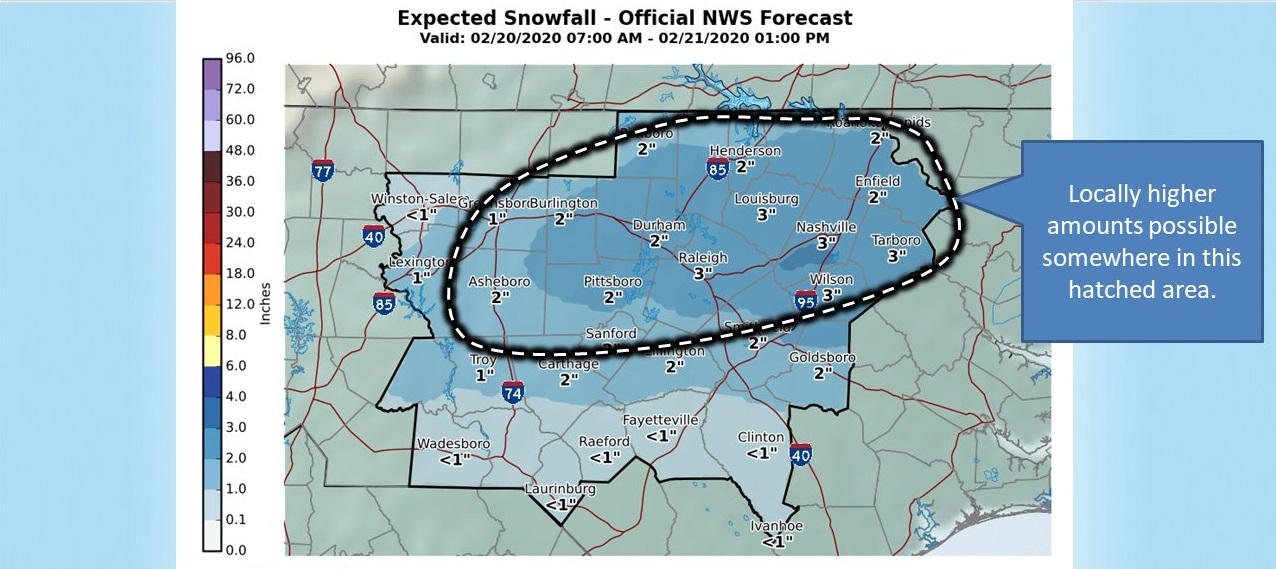When Winter Storm Remus dropped eight inches of snow on the Triangle last week, local public works crews worked around the clock to clear the roads as quickly as possible.
But who – if anyone – is responsible for the sidewalks?
If you walked around Chapel Hill or Carrboro after the snowstorm, you might have found some of the sidewalks remained snowy and icy long after the roads were clear – and the same was true for a number of apartment complex parking lots as well. Who’s in charge of those?
“Pursuant to our town code – it’s actually Section 7.6 – occupants of store buildings are responsible for clearing the sidewalk in front of their building,” says Carrboro mayor Lydia Lavelle.
The town code reads: “Every occupant of a store building, in front of which the sidewalk is paved with stone, brick, asphalt or cement, shall remove snow, ice or other similar obstruction from such sidewalk at the earliest possible time and as soon as the weather permits.”
In addition to businesses and store owners, Lavelle says residents are also encouraged to clear the sidewalks in front of their homes – and Chapel Hill Mayor Mark Kleinschmidt and Hillsborough Mayor Tom Stevens both say their towns have similar policies too.
“For the sidewalks that are in front of your property, the property owners are required – or (rather) requested to do it,” Stevens says. “That’s a policy that probably applies more to shop owners downtown than anything else.”
Read Chapel Hill’s policy on snow and ice removal.
That’s standard procedure across the country – generally speaking, town crews are not responsible for clearing sidewalks; that responsibility typically falls on the citizens.
But the operative word there is “requested,” not “required.” All three towns have it written into their ordinances that residents and store owners are “requested” or “encouraged” to clear their sidewalks – Carrboro’s ordinance says they “shall” clear them – but neither Chapel Hill nor Carrboro nor Hillsborough appear to impose any legal sanctions on residents or businesses who fail to do so.
Lavelle says the reason for that is simple: the towns simply don’t have the authority.
“(When) this happened last winter…we talked at one point about whether we had the authority to require clearing – and we don’t,” she says. “Local authority, that kind of issue. So here we encourage it – but by authority we can’t require it, or (impose a) fine or charge.”

At Timber Hollow Apartments in Chapel Hill, the roads were still covered in snow, slush and ice on Friday morning, more than 24 hours after the snow stopped. (Photo by Aaron Keck.)
It all comes back, in other words, to the problem of “home rule”: by North Carolina law, towns and counties are only able to do what the state legislature allows them to do – and in this case, Lavelle says, the state has not given towns that power.
Compounding the problem, Lavelle says, is the fact that a lot of sidewalks in Carrboro and Chapel Hill simply don’t have storefronts or houses behind them at all – so there’s no one to clear them regardless.
“So in a town like Carrboro, where people are used to walking down Weaver Street between Town Hall and Weaver Street (Market), and then on down to the Hampton Inn and East Main Street project – that’s a lot of sidewalk that just doesn’t get cleared,” Lavelle says.
Facebook and Twitter were abuzz in the last two weeks with residents pointing out icy sidewalks and snow-covered driveways. Lavelle says the towns can “nudge” businesses and residents to clear them off, but beyond that there’s not much they can do.
Kleinschmidt, though, says businesses do have a strong incentive to keep their sidewalks and driveways clear – they may not be subject to fines, but they could be subject to civil suits.
“Private property owners…do risk liability when they don’t keep their walkways clear,” he says. “So it’s always particularly in a business’s best interest to do that – also just to make sure customers feel welcome to come in, when it’s open during bad weather.”
And Stevens says for the most part, people did fulfill their duty.
“Most folks do a pretty good job of trying to make the way clear,” he says. “It was several days with that really bitter cold weather, but we managed to get through.”
Kleinschmidt and Lavelle both say town officials in Chapel Hill and Carrboro are looking into ways to make the response even better next time.
And in the meantime – while there may be a little snow left in the forecast this week – we can all take solace in the fact that last week’s snow will soon be only a memory.


